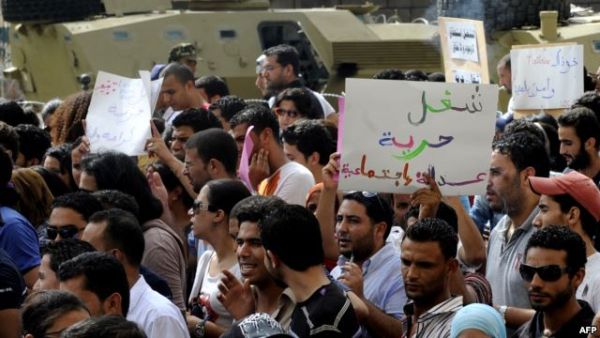Many may assume that the demographic of Tunisia's post-revolution political scene would be dominated by youth leadership. After all, it was youth activists and organizers who led the massive nationwide protests to oust former Tunisian president Zine al-Abidine Ben Ali. Tunisia's 2011 uprising garnered unprecedented international attention among media outlets, ultimately inspiring the coinage of phrases such as the "Arab Spring" and "Arab awakening."
Yet, to even use the word "youth" in the context of Tunisia's political scene today is rather....limited, according to a recent Agence France-Press report. Veteran leaders, steadfast in their efforts to hold onto power, have played a major role in discouraging youth participation-and development-in Tunisian politics at various levels.
As Naima Charmiti, a 32-year-old web manager for Arabesque.tn told AFP, "The revolution of the youths has been confiscated by the old who were hiding at home or abroad during the popular uprising. Our dinosaurs haven’t stopped telling us that we have a political future, but in reality they haven’t done anything concrete.”
According to another youth activist, 27-year-old Tahmeur Mekki, "Right now it’s clear the leaders of parties are all old, and making matters worse, they appeal to even older men!.”
Rached Ghannouchi, 73 of Tunisia's ruling Islamist party Ennahda, and Beji Caid Essebi, 86 of the opposition Nidaa Tounes party, are often considered the two politicians that "dominate" Tunisia's political scene in a country where 51 percent of the population is under the age of thirty.
In true "old guard" form, Essebsi served under Ben Ali's rule as a parliament speaker and previously as a minister under Habib Bourguiba; Ghannouchi returned to Tunisia's political scene in 2011 after spending twenty years in exile.
The two politicians served as key players in Tunisia's recent national dialogue talks that ended in failure Monday with political parties deadlocking over the appointment of an interim prime minister for the country's proposed political transition. And how appropriate: both candidates proposed by the Islamist and opposition parties have been in politics since the country's independence in the 1950s: 88-year-old Ennahda candidate Ahmad Mestiri and opposition candidate 79-year-old Mohammed Ennaceur.
So where are the youth? Within the political party structure, there are regulations and restraints that have discouraged youth involvement and political elites consider youth incompetent, says Salem Ayari, Secretary-General of the Tunisian union for unemployed graduates.
“These people do not believe that young people can take over,” he said. He also described how the exclusion of youth from politics under Ben Ali's regime continues to frame how the old guard thinks about youth participation and representation in Tunisia's new era.
“There is a distrust of ... youths in all companies and parties,” said Selim Ben Abdessalem, a 43-year-old deputy in the Nidaa Tounes party.“It would be a huge mistake to ignore them, but there is a lack of ability to attract them.
Ben Abdessalem further elaborated that politicians are looking for candidates and representatives with experience in government to deal with growing jihadist violence, the political deadlock and renewed economic hardship throughout the country. “Tunisia is in a situation where you don’t go to someone who has no experience in government as prime minister. And if we don’t want those who weren’t in the Ben Ali regime, we have to rely on those from the Bourguiba era.”
Yet, the old guards "experienced" efforts seem to be falling short as well. The failure of the national dialogue and the deepening political turmoil enveloping the country has cast a dark shadow on Tunisia's political future in its current form. Perhaps changes is needed again within Tunisia that harnesses the fresh ideas and voice of the country's largest demographic.








